Progress Over Perfection: Key Insights from the GVBOT Transportation Forum 2023
UrbanLogiq’s COO Herman Chandi at the 2023 Transportation Forum Presented by Deloitte
This year’s Transportation Forum created a platform where industry leaders and government officials converged, fostering an exchange of ideas and perspectives. The pivotal sentiment, “Don’t let perfect get in the way of progress,” served as a focal point. The phrase highlights the need for government policy to match the pace of industry developments and embrace new technologies.
BC’s money is in transportation
In his keynote, Hon. Rob Fleming, BC’s Minister of Transportation and Infrastructure, emphasized the province’s commitment to transportation. For the first time, transportation tops the province’s capital budget. A $13 billion allotment set over three years is primarily destined for transit project expansions.
Fleming said, “The single best bet we could make, given that transportation is about 40% of greenhouse gasses emitted in our province, is in the transportation sector. And within the transportation sector, investing in public transit, which has the added benefit of creating livable, desirable communities and more affordable communities, that are also climate smart communities.”
He pointed to the 2021 floods as proof that government-industry cooperation can achieve results when resources are available. However, he emphasized the need to shift from a reactive to a proactive approach. A portion of the $13 billion will, therefore, go towards future-proofing BC’s vulnerable infrastructure.
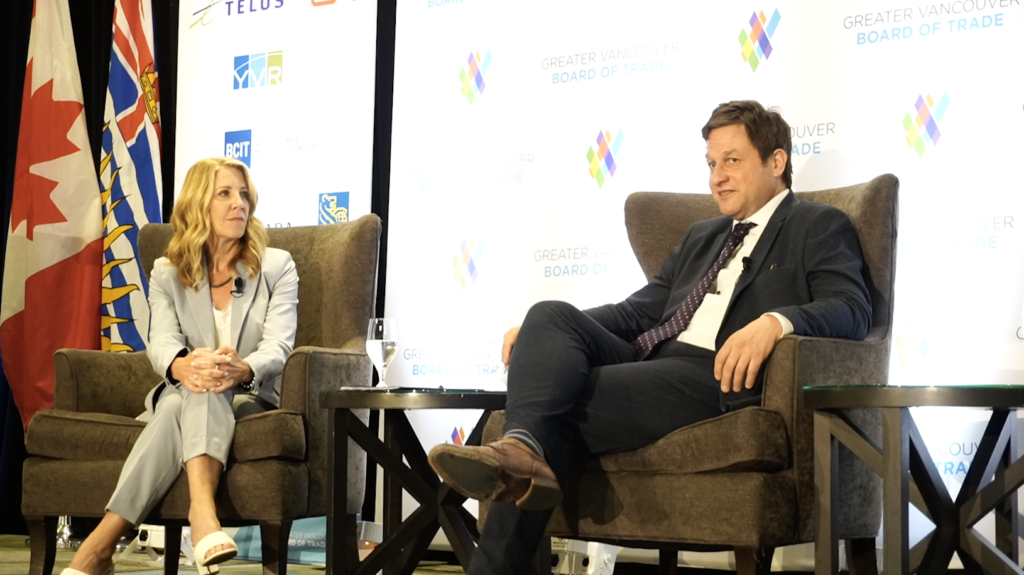
Image source: UrbanLogiq at the Transportation Forum
Motor Vehicle Act changes should pave the way for innovation
His keynote at the Transportation Forum wasn’t all about the money however, Fleming touted changes in the motor vehicle act that are set to foster innovation and facilitate new and micro mobility pilot projects like e-scooters. As well as key safety amendments for vulnerable road users. The changes include a one-meter passing distance, tailgating rules, and mandatory speed limiter technology for commercial vehicles, both enhancing safety and environmental efforts.
Fleming argued, “We cannot excessively speed on our highways because we’ve seen far too many fatalities caused by that. We looked at the evidence in Ontario, they’ve achieved millions of tons of GHG reductions as well because the fuel consumption after 105 km is astronomical.”
According to Fleming, these changes are indicative of progress as the motor vehicle act had remained unchanged for several decades.
Technology and climate change: moving forward sustainably
This technology and climate change panel at the Transportation Forum was composed of UrbanLogiq’s Co-founder and COO Herman Chandi, Chris Gilliland, Director of Technology Development at the Vancouver Airport Authority, Erika Holtz Engineering and Quality Manager at Harbour Air Group, and Sarah Smith Director, Low Carbon Transportation and LNG Business Growth from Fortis BC.
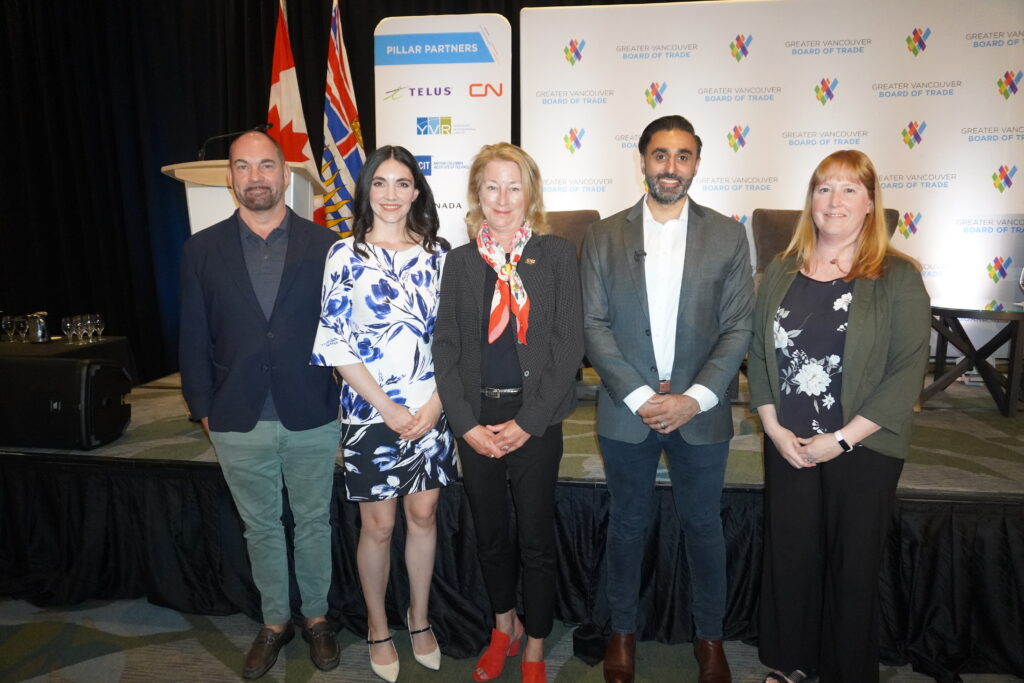
Image source: UrbanLogiq at the Transportation Forum
The discussion covered a wide range of compelling topics. Included was the need to break down data silos within government, YVR’s digital twin technology, valuable insights gained from retrofitting a gas-powered aircraft to go fully electric, and the path forward towards achieving net-zero emissions. The audience had the unique opportunity to learn from well-versed experts with hands-on experience working with new and innovative technologies.
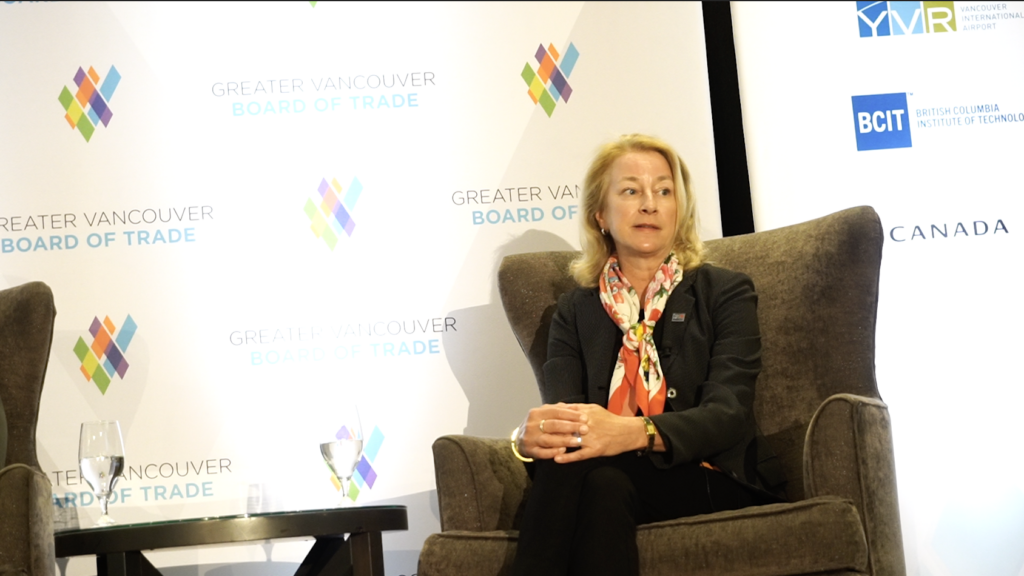
Image source: UrbanLogiq at the Transportation Forum
Progress not perfection
Sarah Smith from Fortis BC encapsulated the panel’s key takeaway. She stated, “Don’t let striving for perfection get in the way of progress today.”
This notion echoed across the panel when discussing obstacles they’ve faced. The main challenge being the government’s struggle to keep pace with fast-evolving tech. UrbanLogiq’s Herman Chandi highlighted how entrenched government procedures slow change, noting,
“There’s a lot of public servants who are very motivated and who want to do their job really well. But you get into this rhythm of, hey, we got to follow the rules, we got to follow the standards that were set in previous generations. And so I think understanding the impact of regulations in a more speedy way is probably one of the biggest opportunities, but also one of the biggest barriers” – Herman Chandi, UrbanLogiq Co-Founder and COO.
Erika Holtz, from Harbour Air Group, warned of outdated regulations hindering innovation, asserting, “Canada has an opportunity to lead in sustainability, to lead in innovative technology. We are and have been ahead of a lot of the other companies that are out there in various ways. But if our government isn’t investing resources at the government to help us get better, we’re going to lose that.”
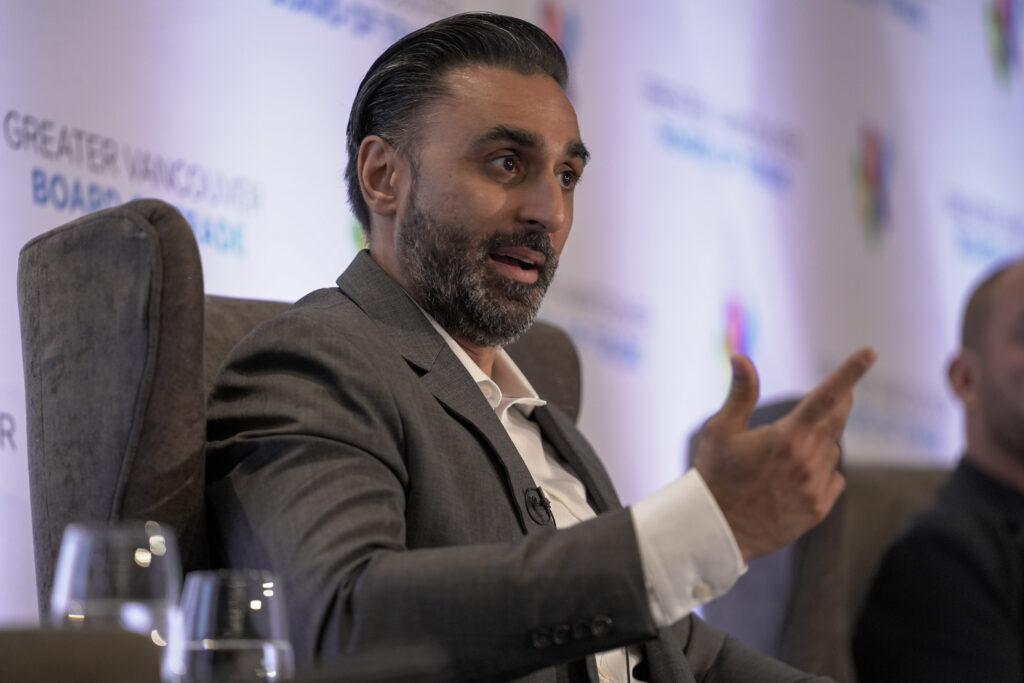
Image source: UrbanLogiq at the Transportation Forum
Government lagging behind industry
Erika Holtz from Harbour Air Group further emphasized her point, insisting on more investment for the government to keep up.
“If you only have four people at Transport Canada that are working on standards and regulations for all the different transportation industries, how can they keep this covenant to set the bar for us, to jump over as an industry to get to there?” – Erika Holtz, Engineering and Quality Manager at Harbour Air Group.
The spirited panel discussion set a motivating tone for the rest of the transportation forum.
The key takeaway was crystal clear: for progress to thrive, government entities must embrace a nimble approach, actively experimenting with new ideas and being open to change when necessary. Rather than waiting for perfection as a prerequisite for action, it is the willingness to adapt and evolve that paves the way for continuous innovation.
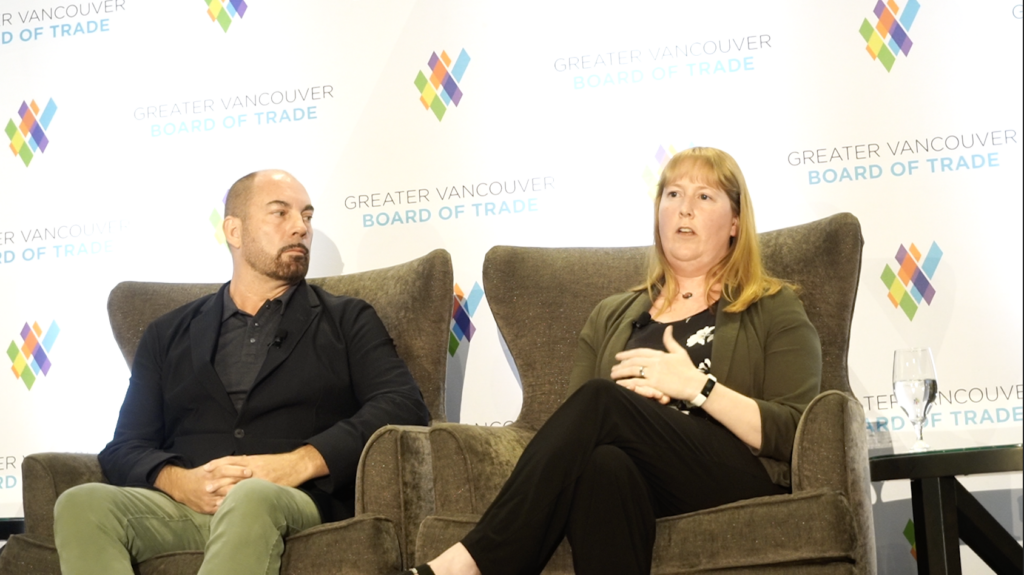
Image source: UrbanLogiq at the Transportation Forum
Urban mobility: moving through a region of change
This panel included BC’s Deputy Minister of Transportation and Infrastructure, Kaye Krishna, Port Coquitlam’s Mayor and Chair on Translink Mayors Council Brad West and Hayden Harvey, Lime’s Pacific Northwest Government Affairs Senior Manager.
Panelists emphasized the importance of thinking creatively about moving people and goods through the region ensuring all elements are interconnected.
In the face of substantial population growth, investment in infrastructure becomes crucial. Brad West honed in on the idea that in order to accommodate this influx, our plans must prioritize the efficient movement of people, using a multi-faceted non partisan approach that doesn’t discount any project or idea.
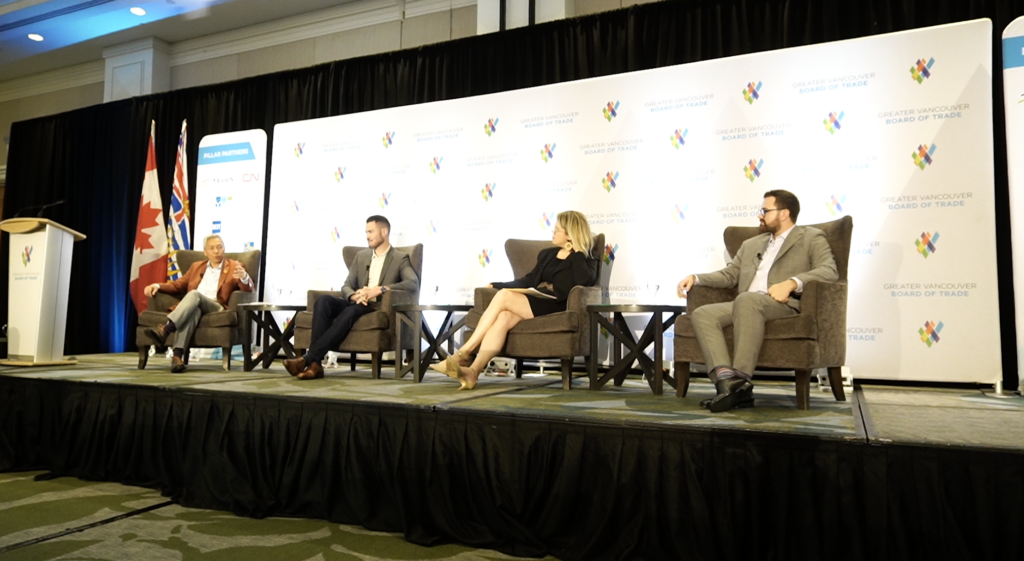
Image source: UrbanLogiq at the Transportation Forum
Less talk more action
West mentioned unanimous Mayoral support for Translinks Transport 2050 plan but said the roadblocks come when it’s time to actually pay for transportation projects.
As West succinctly put it, “we have a plan. It’s been studied to death. We’ve consulted for years on it. The question we have, and the obstacle is, are we willing to pay for it?”
With the urgency of our region’s current transportation challenges, panelists agreed solutions need to not only effectively move people around but also deliver value for money and be implemented quickly.
West mentioned the introduction of nine Bus Rapid Transit (BRT) systems laid out in the Transport 2050 plan as an example.
He stressed that successful delivery of transportation solutions would not only benefit and gain public support, but also accelerate more projects. In contrast, without action, people tend to tune out of the conversation.
Paving the way for micro mobility
Metro Vancouver’s land constraints mean shifting transport behavior is key with the focus on reducing individual car use.
Encouraging people to change the way they move around the Metro Vancouver region, perhaps through novel micro mobility solutions, is critical as the region expands.
Kaye Krishna, BC’s Deputy Minister of Transportation and Infrastructure, highlighted the importance of such initiatives, stating,“the last mile matters. And so things like micro mobility can really make a difference in getting more people to buses, to train stations.”
Hayden Harvey, Pacific Northwest Government Affairs Senior Manager at Lime, noted the connectivity and collaboration within Metro Vancouver, making it a suitable environment for micro-mobility.
“People integrate transit into their daily lives. It’s not the exception, but it’s the preferred method of getting around. And so it provides many, many use cases to micro mobility companies. People are using scooters today.” Hayden Harvey Pacific Northwest Government Affairs Senior Manager, Lime.
However, flexible and evolving regulations are crucial, a theme reiterated throughout the transportation forum.
“And so my ask would be when developing regulatory frameworks and policy with regards to micro mobility, is to leave flexibility so that companies like mine can iterate so that we can adapt to meet challenges and really adapt to solve issues that arise,” – Hayden Harvey Pacific Northwest Government Affairs Senior Manager, Lime.
The need for data
The digital world continues to shape and transform our physical environment, extending beyond land and networks, demanding more consideration.
Reflecting on recent events such as the 2021 atmospheric river and the global pandemic, which resulted in complex supply chain issues, Deputy Minister Krishna highlighted the value of improved information sharing and data management. These incidents showed that challenges could have been better addressed with effective data sharing.
For instance, managing the aftermath of the atmospheric river required daily coordination calls with Transport Canada and other stakeholders to maintain supply chain stability.
Krishna elaborated, “If we had better data and information sharing and a better way of getting around those issues and better visibility into things, I think we’d go a lot further on how we can think about more efficient movements in the supply chain, even in the day to day.”
This highlights the importance of leveraging digital communication tools for real-time crisis coordination and management. Supply chain efficiency is not just about physical movement—it also entails clear, real-time data sharing.
“We’ve got a lot of anchorages and challenges, things moving not as efficiently. So I think data can help there,” Krishna added.
Intertwining the digital and physical world
Further, Krishna underscored the significance of acknowledging Metro Vancouver’s digital connectivity alongside its physical counterpart. She insisted that the digital landscape should be considered as integral as the physical one in strategic planning. Acknowledging this twofold connectivity allows us to handle challenges like climate change more effectively, ensuring our region stays dynamic, habitable, and prepared for the future.
In essence, Krishna called for an integrated approach to discussions about moving both people and goods. She advocates for breaking down silos and viewing these issues as interconnected, understanding that our methods of transporting residents, goods, and conducting business are all interlinked.
In summary, the transportation forum emphasized that progress, not perfection, should be the focus in adopting new technologies and strategies to improve transportation. The takeaway: governments need to be agile, ready to experiment with new ideas, and open to change for continuous innovation.
About UrbanLogiq
UrbanLogiq’s mission is to break down data silos and help government agencies make the most out of their existing data. Our easy-to-use data platform creates one common operating picture of each community by layering different datasets. As a result public officials are empowered to make data-driven decisions faster and cheaper than traditional methods. UrbanLogiq combines data science, data engineering, and big data to help governments build safe and equitable communities.
Our Story: https://youtu.be/hmp-eRd8OUg


